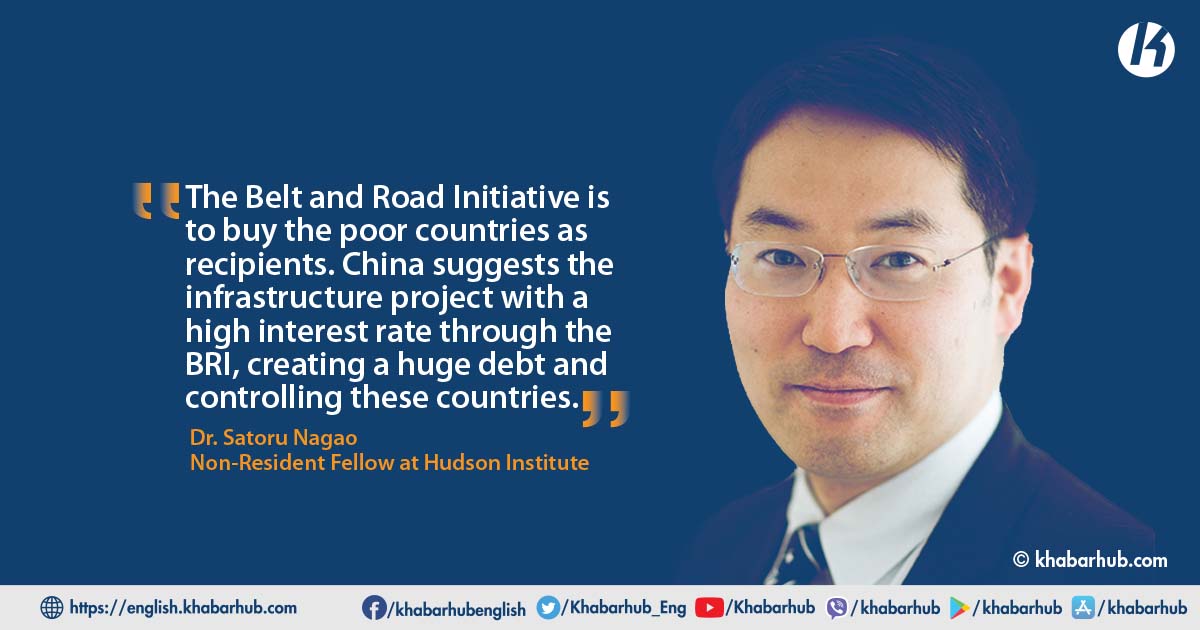Dr. Satoru Nagao is a Non-Resident fellow at Hudson Institute. Previously, he worked as Visiting Fellow at the same institute.
He had worked with several reputed organizations such as Institute for Future Engineering, Gakushuin University, Japan Forum for Strategic Studies, Security and Strategy Research Institute for Japan, Institute of National Security Studies Sri Lanka, Indian Military Review, Center for Strategic and International Studies of US, Tokyo Foundation and the Ocean Policy Research Foundation in Tokyo.
He was a postdoctoral fellow at the Research Institute for Oriental Cultures at Gakushuin University and worked as a lecturer at Gakushuin University, Aoyama-Gakuin University, and Komazawa University.
He was also a security analyst at the Ministry of Foreign Affairs and a first lieutenant of the Japan Ground Self Defense Forces. Dr. Nagao has authored numerous books and articles in reputed journals and newspapers.
Dr. Pramod Jaiswal, Strategic Affairs Editor at Khabarhub, spoke to Dr. Satoru Nagao on the issues related to Indo-Pacific Strategy and Indo-Pacific affairs.
Prime Minister Suga’s one-year tenure was marred by a devastating pandemic response and rapidly dwindling public support according to the polls. With Prime Minister Suga stepping down, the race for the new Japanese Prime minister is underway. What should be the main focus of the upcoming PM? How do you envision the future of the Indo-pacific alliance under the new PM?
According to the survey by NHK, also known as Japan’s BBC, when asked about what kind of topic should be the priority of the government, the first concern for most people was how to deal with COVID-19, the second was how to recover Japan’s economy and the third was security.
But when we check the percentage, COVID-19 got 44 percent, economic recovery got 33 percent but security or diplomacy only got only 8 percent, that’s the situation in Japan.
So, under such a situation, the Indo-Pacific is not a controversial topic in this election because the Indo-Pacific is a big picture of Japan’s national security.
Even if national security itself is not the main topic of the election, Indo-Pacific is a vital part of the national security of Japan.
Unfortunately, they did not talk about it, but because of this, I’m sure to say Japan will not change and fixed strategy. So, no need to worry about the future of the Indo-Pacific in this case.
In response to the security threats in the region PM Abe had pledged to revise Japan’s pacifist constitution forming a new defense strategy enabling Japan to safeguard its interest against these threats in the region. In your view, did PM Suga adhere to similar ambitions and strategies? How should the next PM confront such issues?
Yes, Japan’s policy is a pacifism-based policy but when Nepal Institute for International Cooperation (NIICE) invited Prof. Narushige Michishita of GRIPS (National Graduate Institute for Policy Studies). He explained the interesting part of Japan’s Pacifism.
He stated that Japan’s pacifism is not just mere pacifism rather one kind of isolationism i.e. to not intervene in the situation in foreign countries especially the security area, that is Japan’s theorization of pacifism after World War II.
So now, in the Indo-Pacific Strategy, QUAD, how to deal with China or how to deal with security about the UN peacekeeping, operating, etc. Japan has joined in these kinds of activities.
This means that Japan’s pacifism has already changed, but even the situation has changed, the constitution still has not changed that is why still the people talk about how to amend the constitution, especially when we check Article 9 of current Japan’s constitution, that prohibits the possessed military power despite Japan has self-defense force.
So, Japan’s government changed its interpretation and they said the Self Defence Force is legal because the purpose is only self-defense. But still, this sentence in the constitution is not natural to understand the self-defense force is legal.
So that is why, for the members of the self-defense force, officers and soldiers, Prime Minister Shinzo Abe tried to amend the constitution.
But still, Japanese public opinion is divided. About 30 percent support the amendment, another 30 percent oppose the amendment and 40 percent are still undecided.
So, under such a situation, none of the Prime Ministers has succeeded to change the constitution. Will it happen? I don’t know, but the real situation will change. So, that is the current situation.

At a time when Beijing’s control over disputed South China is growing and the path to resolution narrows, how difficult will it be for the US, Japan, and the regional partners to work together to bolster the rule-based order in the South China Sea?
In the South China Sea, because there’s a power vacuum, China can take the lead, that is the situation. So how to deter to create a power vacuum is needed.
So, in this case, the military capability is needed. But the view from the military capability in their eyes, United States is far stronger than others so the United States must take a charge of the region.
However, in the recent situation, it is not so easy to depend on the United States because……for example, SIPRI (a think tank in the region) has a good database and their military database clearly indicates that from 2011 to 2020 the military expenditure of the United States declined by 10 percent but during the same period the military expenditure of China increased 76 percent.
Still, the United States military expenditure is far bigger than China., but this is the current situation. Another data also indicates the same tendency, for example- how many submarines the United States or China built and deployed between 2000- 2019 the United States built and deployed 21 but China built and deployed 54.
In terms of the capability of the submarine, the United States submarine is stronger than China’s one, that is the reason number is not directly related to the capability.
But when these militaries show their presence in peacetime, it’s impossible to sink them, so in this case, the number is powerful.
They can visit more ports, they can show more presence and thus China can show their interest in many parts of the world by using the number of military forces.
So, under such a situation, depending only on the United States is not an option. US allies must cooperate with it and share the burden.
And that is the reason how to share the burden is very important. Currently, a network-based alliance system is developing.
Traditionally the United States security system depends on the US’s bilateral alliances with Japan, with the Philippines, with South Korea, and with Australia.
In this case, all information goes to the United States and all the US allies depend on the US. And the US will decide and lead them.
Since Japan and Australia are not allies they do not cooperate, the same case is between Japan and South Korea and Japan and the Philippines.
Only the United States got all the initiative but this is a traditional system and is not enough to deter China’s activity.
Now a network-based system is developing, that is how to cooperate. Japan should cooperate with the Philippines, with Australia, with South Korea, with Thailand, or with other US allies.
Why? because this is the new type of system, a network-based alliance system. US allies cooperate with each other and share the security burden the United States took traditionally.
So, the system of cooperating with the United States and its allies will work in the South China Sea. That is how to cooperate in the South China Sea.
What role can India play to support Japan in the South China Sea as it is equally significant for the security of the Indian ocean? Has India’s commitment towards the preservation of the South-China Sea and Indo-Pacific as a whole, increasing recently?
My Ph.D. thesis was the Indian military strategy and the first one in Japan. It indicated how important India is.
When we checked China’s pattern of territorial expansion, it indicated how to deal with China. When China finds the power vacuum in the South China Sea they try to take it.
This power vacuum was created by the changing military balance, for example in the 1950s, when France withdrew from Indochina, including Vietnam, Laos and Cambodia. China took another half of Paracel Island.
Similarly, in the 1970s, when the United States withdrew its troops in Vietnam, China took another half of Paracel island. In the 1980s when the Soviet Union reduced their troops in Vietnam, China took the six features of the Spratly Island in the South China Sea.
Likewise, in the 1990s when the US withdrew from the Philippines, China took the Mischief Reef in the South China Sea.
So, every time when the military balance has changed and there is a power vacuum, China took it. That is China’s pattern of territorial expansion.
Compared with Russia, China is a thief and Russia is a burglar and stealing is the pattern. So, how to deal with China in this case, the answer is to maintain a military balance and to not create a power vacuum.
But how to maintain the military balance? China’s military budget is increasing very rapidly. I have already indicated a comparison between the United States and China as the answer to the last question.
China is increasing its military expansion and the military balance is changing and it is easy to create a power vacuum.
That’s a problem, so how to deal with it. In this case, one of the solutions is that we should divide the defense budget into multi-purpose and multi-direction.
For example, what will happen if Japan and India cooperate? If viewed from China’s perspective, they will have two different enemies and China’s defense budget needs to deal with Japan and India at the same time, East and the South at the same time.
So, China will need to divide the same budget, they cannot use the same budget against Japan and India. So, if Japan and India cooperate, these two countries can divide China’s defense budget and it becomes easier to maintain military balance.
Secondly, since China is finding a power vacuum in the Indian Ocean too, so if India takes charge of the security in the Indian Ocean as a net security provider then Japan, the United States and other countries can concentrate the warships, budget, and other resources to the Pacific side. In such a way, it is easier to maintain military balance against China.
So, India taking charge in the Indian Ocean is another way of cooperation. Thirdly, since China is expanding its territory especially against South East Asia so this is the main arena. When we look at the Indo Pacific, South East Asia is geographically at the center.
So how to support South East Asia is how to deal with China. In this case, Japan supports South East Asia but India already supports South East Asia too.
For example, the Air Force of Malaysia is trained by the Indian Air Force. They possess MiG-29 and Su-30, both are Russian-made fighter jets.
But the pilot and the ground crew are trained by India. Vietnam also receives training from India. Vietnam established its Kilo-class submarines force, this is the first six Kilo-class submarine for Vietnam that can fire cruise missiles against Hainan island of China.
The name of the cruise missile is the Klub missile. So, this is a very precious and important force but advanced training of this submarine force is trained by India.
And Vietnam used MiG 21 and Su-30. For these fighter jets, the crew is trained by India. In this India’s role is very important. Singapore, on the other hand, does not possess Russian-made weapons but they use the training period in India or the Philippines will import BrahMos missiles from India.
And Indonesia asked India for the maintenance of the Su-30 jet. In View of such kind of situation, the military training or maintenance in South East Asia depends on India. India has done well.
Of course. Traditionally, Japan is the main supporter of South East Asia, but in the military field, because of Japan’s “Pacifism”, Japan’s role has been quite limited for a long time.
Now Japan tried to start a project, so Japan tried to intervene in the dispute but still, this is the beginning. Japan donated patrol ships to Vietnam and Malaysia. Joint exercises have happened between Japan and South Asian countries.
But in this case, Japan and India should cooperate to support South East Asian countries to maintain military balance with China. Japan, India, and South East Asia should cooperate and make China’s budget multi directions. That is why Japan needs India’s support to cooperate with India and that is very vital to deal with China.

The US has recently launched a large-scale, all-domain military exercise in the Indo-Pacific region with Britain, Australia and Japan, while the Chinese military training drills are also being carried out in parts of the South China Sea. How do you perceive the current situation in the South China Sea pertaining to such developments?
Interesting situation. We have already talked about Britain, indeed France, Germany, Netherlands and Canada; all these nations have dispatched warships in the Indo-Pacific. So, simply said these are the network-based US allies trying to respond to the call from the US.
I have already explained the difference between the traditional Hub and Spoke system and the network-based system. Traditional Hub and Spoke system rely on the bilateral relation and depend on the US only, but the network system is a cooperation between the US allies and creates a network of the cooperation through; bilateral, trilateral, quadrilateral and multilateral systems and so this network-based security system is not dependent on the US only.
If US allies from the west come to the Indo-Pacific and cooperate with the US allies and partners in the Indo-Pacific like Japan, Australia, Philippines, Thailand, India, this network-based system grows.
Indeed, the image of China is rising, the US is declining, such an image creates some kind of power vacuum. And China believes that it can take this power vacuum.
Hence, to prevent such a situation, the US Network-based security system needs rising power like India and South East Asia.
So, when the US circles gather in the Indo-Pacific including European nations, Canada, rising Asian nations and new partners, the image of the US circle is maintained.
So, the question is how can this network-based security system maintain its power and deal with rising China. Indeed, this is very important because China has only one former ally, which is North Korea, but the US has 52 former allies including Taiwan.
The US has its new partners, too. Thus, the US circle is very big. If these allies gather in one place and coordinate well, the possibility of the US victory in the US-China competition will grow and flourish.
I need to add one more explanation- the number of allies is very important. The last three competitions, which are World War 1, WW2 and the US-Soviet cold war, are very important. In WW1, four countries fought with nearly 30 countries and in WW2 54 vs 8, and in the Cold War, 54 vs 26.
So, if the US consisted of 52 allies and China had only one, it is easy to expect, which side would win. So, the number of allies and the coordination of the allies and partners is a very important factor to which side would win the competition.
Therefore, that is the reason why the US circles are engaging in the South China Sea by coordinating with allies. That is very important. The US side has tried to use this very advantage over China.
Japan’s former Prime Minister Shinzo Abe had succeeded in building a strong alliance with the members of the QUAD for the containment of rising China. Has Prime Minister Suga been able to foster the relationship among these member countries amid pandemics? How do you compare their roles in the issue?
Japan was the pioneer of the QUAD in the Indo-Pacific, that’s true. PM Shinzo Abe addressing the Indian parliament in 2007, indicated the two concepts- QUAD and the Indo Pacific. even though he did not directly use the term in his address.
That is the reason this idea is Japan’s idea but at the same time from the view of the size of power and the view from the military policy, this concept depends on the US, which is also the fact. The US leadership is needed.
But US leadership depends on the will and the capability. So the view from the will, of course, the US has a will to compete with China, and to win the competition. That’s true.
Similarly, in terms of capabilities, still, the US is the strongest country in the world, but at the same time, the image has changed, especially, withdrawal from Afghanistan.
Just after the Afghanistan government that the US had supported collapsed very fast-paced and the US hadn’t expected such a rapid situation.
So that is the reason, currently, many people doubt the Biden administration, especially, their diplomatic skill. Under such a situation, even if the US has the will and a capability, it looks like China or Russia can exploit the situation to expand their territory.
Therefore, under such a situation, the role of allies is very important, especially the regional countries like Japan should take charge to support Taiwan or maintain military balance in the South China Sea and try to recover the image of the US.
Of course, the reason why the US withdrew from Afghanistan, was to relocate their resources from Afghanistan to the Indo-Pacific to deal with China.
But at the same time, viewing the amount of the resources withdrawn from Afghanistan is useful but at the same time, unfortunately, the image of the US abandoning Afghanistan which is the former ally of the US has been established and doesn’t send out a good signal to its allies.
Hence, Japan should support South East Asian countries, especially US side countries, or coordinate with other partners like India, Australia and try to fill the gap of the image.
So, although the next Japanese PM has not been decided yet, it is one kind of promise that the next PM will do the same.
So, how to deal with and maintain the powerful image of the US side is a little similar issue. Delivering the COVID 19 in many countries is one kind of policy to strengthen the US side.
Amid the pandemic, this is the very priority issue in many countries, including Japan. So, Japan is donating vaccines to Taiwan, Vietnam, and other US side countries now.
Hence, the US also tried to by using the QUAD framework in four countries-Japan, the US, Australia, India coordinate to prepare the vaccine.
The other areas, how to maintain the oil prices or how to improve the supply chain which does not depend on China or how to maintain economic development or how to recover the economic development or how to supply energy to the US side countries, all of these things depend on the US and its allies on its side.
So, Japan should take charge, if something that the US cannot do, or something that the US fails and we need to recover the image of the US side.
What hopes does Japan have for the upcoming first in-person QUAD summit that is taking place on 24 September in Washington DC? What does it anticipate to achieve out of the meet?
On the surface, maybe the statement of the QUAD summit will not publish military-related cooperation but as I have already told PM Shinzo Abe was the pioneer.
Originally this QUAD had a military aspect I think and still this military aspect is very important. Why? Why did PM Shinzo Abe introduce this idea-QUAD and the Indo Pacific?
Of course, the Indo Pacific is needed because the Pacific side and the Indian ocean side developed at the same time.
The Pacific side is developing economically and the Indian ocean side is developing economically but they are not just developing economically because when the economy rises, they can get the budget and they can use the budget for their military.
In the past, European countries were powerful both economically and militarily. That was why the big war has happened in Europe, the influence spread the world and the people called this the world war.
But because the Indo-Pacific region is developing very fast, this region is also very important in world politics. If something has happened in the region, it will spread in the different regions of the world like Europe.
Of course, Europe is important now but the Indo-Pacific is rising. In this case, a new concept is needed, including both the Pacific and the Indian ocean, that’s the Indo-Pacific.
But secondly, this Indo-Pacific is very important and should be combined with the QUAD because PM Shinzo Abe does not wish or want the Indo-Pacific to be a China-dominated region.
Did China dominate the region-how to deal with it? That’s the reason why we have QUAD. QUAD is a group of great powers except for China in the Indo-Pacific.
So, QUAD and Indo-Pacific are one set. QUAD maintains a power balance in the Indo-Pacific against China. And in this case, how to include India is the topic because indeed when we talk about the Indo-Pacific if India is outside of the Indo-Pacific, we do not need to say Indo-Pacific, just the Pacific or, Asia-Pacific is enough.
We do not need to say Indo-Pacific if we do not need India. QUAD is the same. Why QUAD is important because of India. If the US and Australia and Japan cooperate trilaterally, both Japan and Australia are US allies, so there are many chances for them to cooperate.
We don’t need to call this concept the QUAD. So, QUAD in the Indo-Pacific was the concept to indicate how important India is.
This is the original idea of the QUAD. So, how to maintain power balance with China was a very important topic originally. Hence, when the four leaders gather in Washington and talk about the cooperation of the QUAD, automatically it will be about how to deal with China.
How to deal with China’s influence. But despite this, when we check the joint statement, from the QUAD, they do not mention military cooperation so much.
For e.g. the 1st summit of the QUAD that happened last march this year, they established three working groups- 1st one is how to supply the covid 19 vaccine.
The second one was about technological cooperation, especially the supply chain and the third one is climate change.
These three working groups do not directly relate to military cooperation. Why? One of the reasons is India. Because in comparison with the other three countries, India shares a land border with China.
If China decides to attack QUAD at the same time. Which country will be the first target? It could be India because of the land border.
China provokes Japan, Australia, or the United States but they need to cross the sea first, but in the case of India, it is easier to attack or provoke.
Similarly, the last war was in 1962 and India lost, even if this is a limited war. So because of this, the view from China, it is easier to make pressure on India.
And India is not the former ally of the US. When Chinese leaders decide to attack, provoke, or persuade one country to leave from QUAD, India is the easiest target. In this case, China tried to raise the tension on the Indo-China border and tried to intimidate India even if India would not accept such an offer.
Indeed, what happened is after the Galwan valley in the year 2020, where 20 Indian soldiers sacrificed their life and 76 Indian soldiers were injured by the Chinese troops, that time, India as a courageous country that tried to cooperate with other QUAD members.
China tried to intimidate India, but India’s response was completely opposite. That’s actually what happened. But despite this, sometimes the country make mistake, in the past, when China intimidated Taiwan because in the Taiwan election, one of the candidates was not in China’s favor and China tried to influence the election in Taiwan, which happened in 1996 but China failed.
The candidate that China disliked won the election in Taiwan. So, a similar mistake could have occurred in the India-China border area.
But, because of such a situation, India does not wish to appeal to the military aspect of the QUAD in the QUAD meeting.
That’s why in the joint statements, we cannot find the military aspect of the QUAD so much but indeed originally, the idea of the QUAD came from the military and power balance between QUAD vs China.
That is the reason, in the next QUAD meeting, therefore I think they will talk about military cooperation and not only economic security cooperation, vaccine-related cooperation, or climate-related cooperation.
A stronger political push for an economic decoupling from China has been a hot topic of political discourse in all the QUAD countries including the EU and G7. How do you see the potential role of initiatives like Blue Dot Network and B3W in this process? Will the initiatives provide a viable alternative to China’s Belt Road Initiative (BRI)?
Indeed, China’s problem is the problem of money. why? Changing the military balance is also a matter of money. Is this the problem of money? Yes indeed! Because an unapproved budget is a key to rapid military modernization.
The Belt and Road Initiative is to buy the poor countries as recipients. China suggests the infrastructure project with a high interest rate through the Belt and Road Initiative, creating a huge debt and controlling these countries, these recipients.
Why has such a situation happened? It is because China has an ample budget. In this case, money is the key so what should Quad do? What should the EU do? What should G7 do? Money and economic security is the answer.
For e.g. when China suggests infrastructure projects with a high interest rate, why did the recipient accept such a high-interest rate? Because there is no alternative for infrastructure projects. If QUAD countries, EU or G7 suggest alternative projects these recipients can choose which one is better.
So, these infrastructure projects deal with China’s policy. Economic security and decoupling are needed. Why? Of course, decoupling today is impossible but as a long-term process decoupling is needed because to deal with China, we need to reduce China’s income.
How to reduce China’s ample budget is the key. So, Japan’s trade depends on China’s market. Japan cannot show a strong stance towards China because this trade is important.
Without decoupling any country cannot choose a strong stand against China. That is the reason decoupling is needed, as it reduces China’s income.
To maintain military balance, to maintain economical balance, to maintain the power balance. Decoupling is needed even though decoupling is a long process. Countries should do it one by one as a long-term process.









Comment